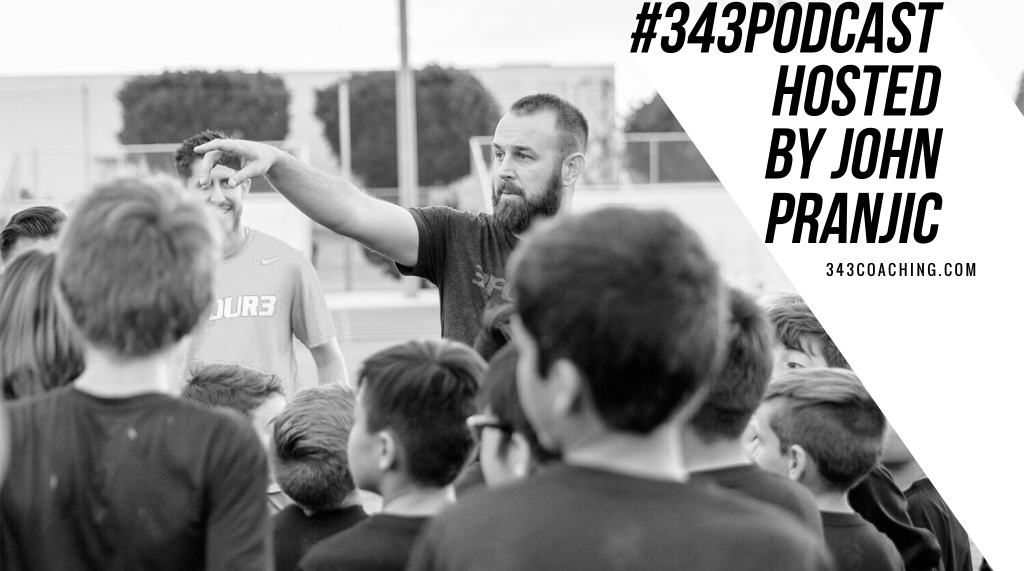

There are a number of different influences players will encounter throughout their youth career.
- The household/parent/family influence.
- The playing on your own influence.
- The pickup game influence.
- The structured club training influence.
- The personal training influence.
There are a number of different components embedded within each of those influences. All of which can, and should, be dissected to get beyond the superficial level in order to achieve a greater understanding of player development as a whole and everyone’s role in it.
To help with that we’re going to drill down into the structured club training influence to examine the role of the coach and some characteristics that truly exceptional coaches must possess.
So, let’s get into it.
In order to extract the most out of players, you, the coach, are responsible for creating an environment that keeps the players engaged and motivated.
One of the main mechanisms for doing that is that the players must enjoy themselves.
Put even more simply: Players have to have fun.
It should be obvious that you must create an environment that players want to go to – at least most of the time. Because, of course, everyone needs a break from time to time. Everybody goes through episodes when getting amped up for training is hard. Or getting motivated for workouts is difficult. But, in general, players should enjoy going to your training sessions and should want to participate in them.
Unfortunately, many coaches use this “fun” component incorrectly.
Many of them think it should be all about fun all of the time.
And that’s just not true.
The reality is that if you want to create top, top, top-level players, or develop your current crop of players to the best of their abilities (aka to their full potential), you have to have the skill of balancing fun and competition.
You have to have that balance.
But this is very difficult to achieve.
To explain in greater detail, enter Gary Kleiban:
“If you err too much on one side, say the competitive side, then you might lose the team. Or you might lose what your objective was. Which is to keep the players engaged, motivated, and enjoying themselves.
If you err too much on the side of fun, well then it’s highly likely that you’re not going to create a competitive environment in your training or in your games. Hopefully, for self-evident reasons.
If everybody is joking around and not taking things very seriously, those are the ingredients to unravel a competitive environment.
But if you make it all about the competitive environment like getting stuck in, taking it as seriously as a game, giving your maximum effort at every point in time, no excuses, and forcefulness, pointing out errors all of the time – if you err too much on that side – then you risk losing the fun and enjoyment component. Then, the players tune out and become disengaged. Or, worse, they no longer want to participate. This is frequently referred to as “burn out”.
The challenge is in the skill of balancing those two things and it’s FAR more difficult than people think it is.
It takes a unique individual to be able to do that.
Here’s why…
1. You really have to have a high degree of expertise in what you’re teaching.
In your case, you have to have a high degree of expertise in football.
If you don’t have a high degree of expertise, then several things can happen.
You won’t have credibility with your players. Eventually, they’ll smell you out and know that you’re a fraud. This can happen at a very young age. What age? It could vary, but they will eventually smell you out. And if they don’t smell you out, then the parents of those players will smell you out. Then, you’re going to lose credibility with the players and the family anyways through the conduit that is the parent.
So, you really, really need to know what you’re talking about when it comes to football.
And point number two is along those same lines.
2. When you really know what you’re talking about, you’re able to flow.
Not just flow but flow seamlessly. And once you’ve accrued experience to know how to deliver certain messages to the point where the person receiving the message totally gets it and can execute what it is that you want.
So, expertise in football is the number one thing you need to have to achieve this balance between fun and competitive at a high level.
On the fun side of the equation, you need to have an incredibly high level of empathy for human beings, and even more so if you’re coaching youth players.
All of that changes depending on the age of the youth player.
The way you talk to a 10-year-old is different than the way you talk to a 14-year-old. The way you talk to a 14-year-old is different than you talk to an 18-year-old.
So, you have to have the capacity to engage those three different types of humans on their level, with their language, with their body language – with everything – in order to communicate effectively with them and in order for you to know what buttons to push to get the response that you want.
Not just in that moment, but throughout the entire season. Or throughout the two or three years you have the player under your tutelage.
You have to know how to push each individual’s buttons.
And just because you’re coaching 10-year-olds doesn’t mean all 10-year-olds are created equal.
So, you have different personalities. This means you must observe and create a mental model so that you know how to talk to Johnny and then you know how to talk to Mark. Because they’re not the same person.
Sure, there’s a lot of commonalities, but the buttons each kid needs to have pushed to get the results you want might be different.
Your level of empathy.
Your level of awareness.
Your level of analysis of those things needs to be of a very high degree in order to get that fun and competitive nature out of each player.
You need to have those two skills.
Most people don’t. (And they know it instinctively.)
That’s not necessarily a knock on them. It’s just very difficult and it takes a lot of years of expertise and experience.
If people don’t have those skills, then what many of them end up doing is throwing their hands up in the air and say, “Fuck it! I can’t do this. It’s too hard. I don’t know what to do. So, let’s just make it all about fun.”
This is the root of why we see a lot of coaches, parents, media, and people in the soccer community saying things like:
“It should all be about fun and enjoyment.”
“We’re putting too much pressure on the kids.”
And many other things…
They have that angle because they don’t have the skill to do what’s right.
They don’t have the skill to create the appropriate balance of fun and a competitive environment.”
There is a lot more that could be added to this, and likely will in the future, but I’ll end today’s episode with just one more thought.
After the announcement of the Development Academy shutdown was made, former USWNT player Julie Foudy tweeted this:
“First order of new player development, let’s bring the joy back. Players don’t want to grind and get better unless they enjoy the grind. I’d argue I became a top player mostly because I loved to play and I loved my teammates.”
On the face of it, her statement sounds good.
There’s even a hint of “balance” suggested. Just like we talked about.
But the problem with her statement is two-fold:
1) There is no hard grind in the American soccer environment. It’s SOFT here. So, the premise of “bringing back joy” is already BS. In America, it’s already more about joy and no competition. It always has been. And those who disagree with that, are precisely why the system is so SOFT. To advocate for more softness is actually a step in the wrong direction.
2) This is just the latest example of using “fun” as a political instrument to absolve oneself of accountability in the competitive realm.
As we discussed throughout the episode, if the objective is to produce top, top, top-level players, then things like “joy” and “fun” cannot continue to outweigh the competitive aspect by large margins.
This rings true whether we’re talking about the macro-level, things such as how the system is set up or how our soccer is governed and by whom.
But it also rings true at a micro-level and how things such as clubs, teams, and coaches can influence a player’s development.
Never miss new episodes:
- Subscribe to 3four3 FM on iTunes
- Subscribe to 3four3 FM on Stitcher
- Subscribe to 3four3 FM on Spotify
Coaching Education Program
This is brought to you by the 3four3 coaching education program.
Learn more and join over 400 coaches using our proven possession-based methodology.
Nice!